Hoffa Blu-ray Movie
HomeHoffa Blu-ray Movie 
Filmmakers Signature Series20th Century Fox | 1992 | 140 min | Rated R | Sep 18, 2012
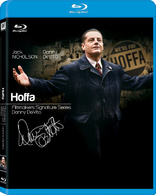
Movie rating
6.7 | / 10 |
Blu-ray rating
| Users | 4.5 | |
| Reviewer | 4.0 | |
| Overall | 4.0 |
Overview
Hoffa (1992)
Based on the story of legendary union figure Jimmy Hoffa.
Starring: Jack Nicholson, Danny DeVito, Armand Assante, J.T. Walsh, John C. ReillyDirector: Danny DeVito
| Biography | Uncertain |
| Drama | Uncertain |
| Crime | Uncertain |
Specifications
Video
Video codec: MPEG-4 AVC
Video resolution: 1080p
Aspect ratio: 2.35:1
Original aspect ratio: 2.39:1
Audio
English: DTS-HD Master Audio 5.1 (48kHz, 24-bit)
Spanish: Dolby Digital 2.0
French: Dolby Digital 2.0
DD all 224 kbps
Subtitles
English SDH, Spanish
Discs
50GB Blu-ray Disc
Single disc (1 BD)
Packaging
Slipcover in original pressing
Playback
Region free
Review
Rating summary
| Movie | 3.5 | |
| Video | 4.0 | |
| Audio | 4.5 | |
| Extras | 5.0 | |
| Overall | 4.0 |
Hoffa Blu-ray Movie Review
Wait a sec, he had children?
Reviewed by Brian Orndorf March 3, 2013“Hoffa” is a presentation of shameless mythmaking, though one that’s supported by such barnstorming direction, it’s impossible to dismiss it outright. It’s a boldly designed, volcanically acted endeavor that doesn’t seek to understand its subject on anything more than a surface level of engagement. This is not “Jimmy Hoffa: The Movie,” but a valentine to a shifty guy who didn’t let anything stand in the way of his vision for a unionized America, shielding his unsavory interests behind an ideal of blue collar protection, where the common man could be comfortable in the knowledge that loyal brothers and sisters were there to defend his right to work in a safe, financially rewarding environment. There’s little dimension to Danny DeVito’s picture, replaced with shockwaves of cinematic orchestration that help to preserve interest in the titular titan, even if viewers walk away from the film with only a slightly more refined appreciation for Hoffa’s dedication to the cause.

As a young idealistic man, Jimmy Hoffa (Jack Nicholson) took to the streets to persuade desperate workers to join the expanding Teamsters’ Union, selling the switch as passage to a better life of vocational protection. Working his indefatigable spirit, Hoffa’s compassionate personality swayed thousands, including truck driver Bobby Ciaro (Danny DeVito), a diminutive but forceful figure who grew to become Hoffa’s right-hand man. Struggling to maintain union interests in the face of powerful business leaders, Hoffa aligned himself with organized crime, creating a dangerous influence that complicated his journey toward integrity and leadership, eventually triggering a government investigation spearheaded by Robert Kennedy (Kevin Anderson). As the years pass, Hoffa rises in power, balancing his workload with confidant Frank Fitzsimmons (J.T. Walsh), while falling deeper into complex designs of monetary flow with union money, exposing the bulldog to the humiliation of prison and betrayal as his dreams of influence are cruelly stripped away.
It’s fitting to have David Mamet as the screenwriter of “Hoffa,” finding one salty, chewy man dreaming up clenched fist dialogue for another. While the title of the effort certainly promises an investigation into the life and times of Jimmy Hoffa, the writing is instead focused on the union-building days of the man. It’s a story told in flashbacks beginning in 1975, where Jimmy and Bobby wait anxiously in the parking lot of a rural diner to meet with mob boss Carol D’Allesandro (Armand Assante) to discuss their clouded future with the Teamsters’ Union. Downing cigarettes and coffee, the men mentally sift through their shared history of organizing, where Jimmy used his powers of persuasion and negotiation to introduce a focal point of security to men working themselves to the bone for pennies. Fighting to secure his place in the organization and shift the balance of power in the Midwest throughout the thirties and forties, Jimmy watched his influence spread like a rumor, with workers careful to silence their union aspirations out of fear of job loss, including Bobby, who we first meet as a feral, knife-wielding driver who catches the organizer’s eye with his direct manner and loyalty.
“Hoffa” begins in the middle of Jimmy’s life, and without any real time stamp to help gauge progress, it wanders through the decades, picking up the basics of the leader’s career as he moves from player to president, taking over the Teamsters’ Union with a radical plan of control that suited his interests. “Hoffa” isn’t always easy to follow, requiring some previous knowledge of the subject’s history and familiarity with the flurry of last names that blanket the script, but the essentials of passion and violence are carefully established, watching strike stand-offs explode into riots, while Jimmy himself is involved with underhanded dealings used to push management to seek out union enlightenment. “Hoffa” doesn’t brazenly slap a pair of wings on Jimmy’s back, reinforcing his illegal interests as his mob ties strengthen. However, it’s hardly a dimensional portrait of the man, employing David Newman’s gorgeous, emotional score to reinforce the boss’s crooked sense of nobility, doing whatever he could to secure union demands while massaging his own self-interests in the organization. In fact, “Hoffa” is almost deliberately abstract at times, constructed out of hazy memories and backroom storytelling -- a cinematic game of telephone where Jimmy Hoffa ends up a hero for the common man, despite the blood on his hands. It’s an interesting approach to a challenging story, even with considerable holes in the characterization.
Perhaps the most egregious error Mamet and DeVito make is leaving out Jimmy’s home life, transforming wife Jo (Natalia Nogulich) into a vague player in the proceedings, while it takes roughly 100 minutes before any sense of a home life is established, finding a brief display of a grandchild waving farewell to her prison-bound grandfather more confusing than heartbreaking. “Hoffa” ignores Jimmy’s domestic situation to such a degree that eventual glimpses into his home life are jarring, hinting at a direction the picture would’ve been wise to take. Better to leave it all out than to offer only frustrating suggestions of such fascinating vulnerability.
While plotting is flawed, “Hoffa” showcases a sublime directorial gymnastics routine from DeVito, to pilots the picture with exquisite attention to visual storytelling, working with cinematographer Stephen H. Burum to create inventive transitions and unusual special effects that generate an irresistible forward momentum to the effort. While Nicholson provides a forceful punch of ambition as Jimmy, a thoughtfully measured act of imitation that’s aided by marvelous make-up work, “Hoffa” truly belongs to DeVito and his epic vision for such an intimate tale of defiance. Using the widescreen frame to its maximum potential, the director employs a thrilling cinematic language that sustains the material’s passion and its mournful atmosphere. The helmer is blasting away with the audacity of a film student, making “Hoffa” an effort of extraordinary detail, craftsmanship, and directorial ingenuity. The technical achievements of the movie are simply stunning, gifting the feature a magnificent sense of scale.
Hoffa Blu-ray Movie, Video Quality 
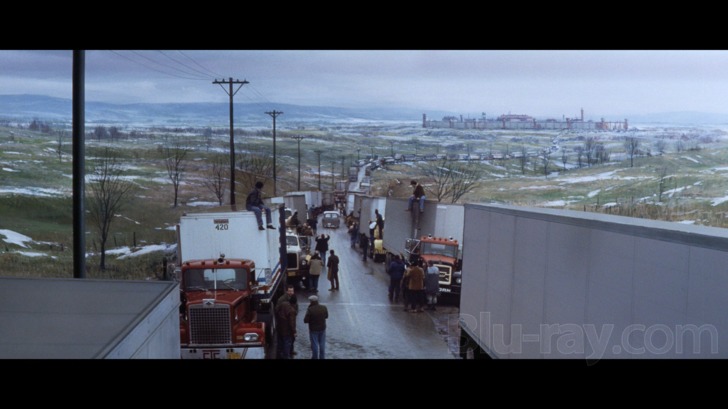
The AVC encoded image (2.35:1 aspect ratio) presentation for "Hoffa" remains quite faithful to its original theatrical appearance, boasting impressively deep colors that articulate the autumnal and winter moods of the movie. Hues are rich, showing no signs of fade, keeping costuming lush and skintones impressively human. It's a clean image (offering only a thin layer of grain) with a hint of filtering, yet there's little to criticize here, as fine detail is maintained, allowing a genuine inspection of the make-up department's stellar work, while fabrics and set construction provide touchable textures. Shadow detail thickens some during evening sequences, but blacks are largely deep and true. The viewing experience is balanced and striking at times, keeping DeVito's tricks and luxurious mood open for inspection. No damage was detected.
Hoffa Blu-ray Movie, Audio Quality 
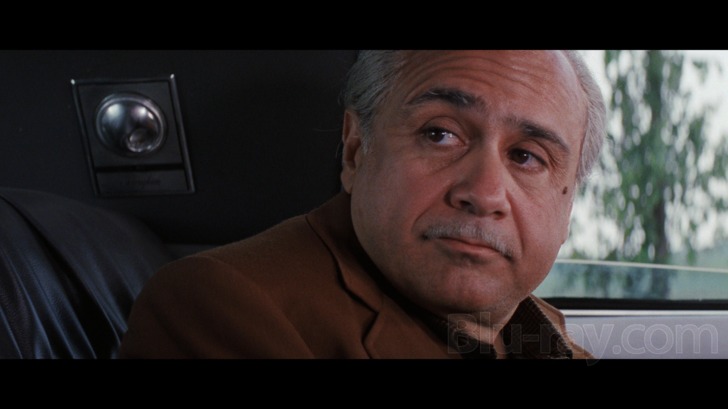
The 5.1 DTS-HD MA sound mix for "Hoffa" is generally successful with its sonic intentions, providing a full sense of mood and dramatic tension without distortion. While not employed for much of the feature, surrounds are quite immersive when called upon, handling atmospherics and distances with clarity, while crowd dynamics are properly serviced, generating a true feel of group events. Directional activity is also cleanly handled. Dialogue exchanges are secure and significant, with rich tones and a crisp balance of dialogue delivery. Scoring is intentionally pronounced, yet never obstructs the verbal exchanges, easily carrying on-screen events to euphoric heights, retaining sharp instrumentation and range. Low-end isn't a consistent event, but explosions and assorted intensity is hearty.
Hoffa Blu-ray Movie, Special Features and Extras 
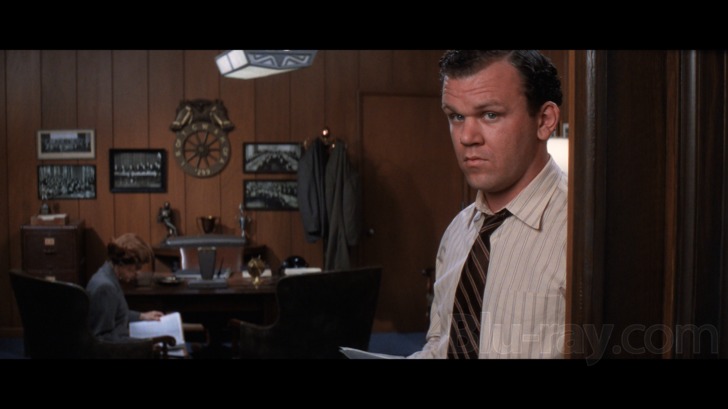
- Booklet (26 pages) supplies filmographies, production notes, and critical appraisals.
- Commentary with Danny DeVito is primarily a technical affair, with the director pointing out his scene-specific intentions with complex transitions and labor-intensive camera moves, carefully to isolate creative achievements from the crew. DeVito is obviously a charming, funny guy, and the track reflects his rascally personality, with plenty of stories about his interactions with the cast shared. However, the discussion is mostly filled with reverence, peppered with a little play-by-play to lubricate the one-man show.
- "The Music of 'Hoffa'" (10:3, HD) greets DeVito and composer David Newman in a Fox screening room to discuss the musical mood of the picture. The score started life as trailer music, winning over the production to such a degree, it fed into the feature, with DeVito and Newman discussing creative choices and emotional orchestral cues that assisted the complex visual design of the effort.
- "DeVito's Speech at the 2011 Teamsters Convention in Las Vegas" (15:16, HD) spotlights the actor's visit to the gathering of brothers and sisters, using Hoffa-esque techniques (and DeVito-esque humor) to rile up the crowds as he shares his experiences with union crews and his life with the Screen Actors Guild. Taken out of context, and one could easily assume that DeVito is running for the Teamsters presidency.
- Excised Scenes (5:18, SD) explores more of Hoffa's rhetoric with his friends and enemies, extended time during a pivotal hunting trip, and collects a few unused shots meant to establish location.
- "Historical New Coverage of Hoffa" (7:54, SD) presents a congressional showdown between the Teamsters leader and Robert Kennedy, isolating the strength and volatility of character and the precision of its eventual Hollywood interpretation.
- "Personal Anecdotes from Members of the Teamsters Union" (6:36, SD) gathers a few of Hoffa's brothers to reinforce the subject's sense of fair play and dedication to the cause, also detailing his impoverished upbringing to best understand his self-educated rise to power.
- Special Shots (14:13, SD) is a fascinating dissection of a few of the film's more impressive optical tricks, offering commentary from DeVito, who walks through numerous scenes with the viewer, sharing technical tips and cracking wise.
- "DeVito's 11 1/4" (11:02, SD) is a comical assembly of BTS footage, displaying cast and crew antics as they entertain themselves between shots. It's highly amusing, with Nicholson especially relaxed and playful with his co-stars. The featurette also points out Tim Burton's cameo as a corpse during a funeral sequence.
- "Siskel & Ebert" (4:28, SD) offers a clip from the famous movie review show, where the critics discuss their positive review.
- "Discussion After First Script Read-Through" (3:34, SD) is an audio presentation where the actors chat up the themes and characterizations of the movie during its planning stages. Captured accidentally, the quality of the recording is disrupted by Nicholson's incessant pounding on a table.
- Production Gallery offers an extensive amount of BTS photos from the set.
- Shooting Script is provided.
- And an exceptional Theatrical Trailer (2:06, SD) is included.
Hoffa Blu-ray Movie, Overall Score and Recommendation 
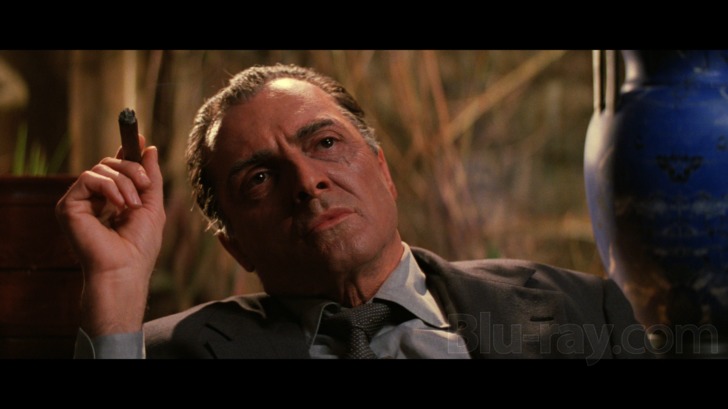
"Hoffa" isn't an educational viewing experience, but a picture that's meant to inspire, isolating a raw drive of ambition for a special cause. While it displays the muscularity of an explosive bio-pic, DeVito and Mamet would rather remain in the shadows, keeping their subject's fallibility to a minimum as they explore grandiose acts of mythmaking. It's far from nourishing, but "Hoffa" retains an irresistible exterior appeal even if it only provides occasional peeks into penetrating drama.
Similar titles
Similar titles you might also like

Loving Pablo
2017

House of Gucci 4K
2021

Capone
2020

Black Mass
2015

Casino Jack
2010

Gotti
2018

The Irishman
2019

Molly's Game
2017

Gotti
1996

GoodFellas
1990

Vice
2018

Professor Marston and the Wonder Women
2017

The Wolf of Wall Street 4K
2013

Talk to Me
2007

Papillon
2017

Narcos: Season Two
2016

Devil's Knot
2013

The Fifth Estate
2013

Kill the Irishman
2011

A Prayer Before Dawn
2017